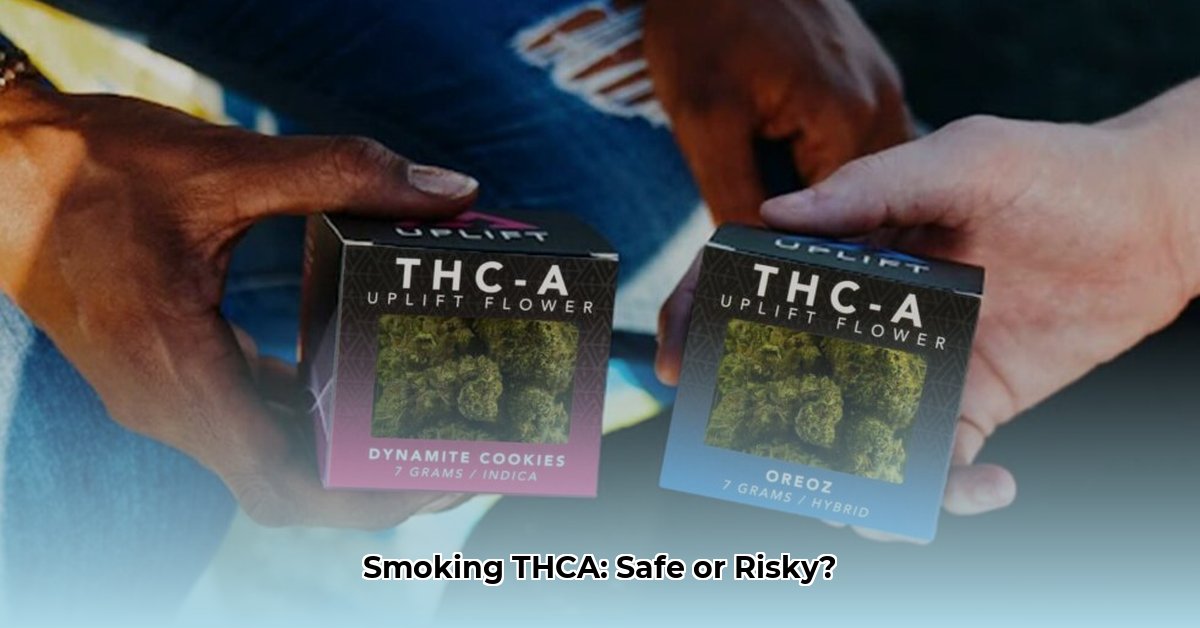THCA and THC: What’s the Difference?
THCA (tetrahydrocannabinolic acid) is found in raw cannabis and is often called the “precursor” to THC (tetrahydrocannabinol). While they sound similar, their effects are distinct. THCA, in its raw form, is non-intoxicating. It’s the heat from smoking, vaping, or cooking that converts THCA to THC, the psychoactive compound responsible for the “high.” This transformation is called decarboxylation.
Debunking the “THCA is Safe to Smoke” Myth
While THCA itself isn’t intoxicating, smoking it does get you high because of the conversion to THC. Furthermore, smoking anything involves inhaling harmful byproducts of combustion, including carbon monoxide, tar, and other irritants. These byproducts pose risks to respiratory health, potentially leading to bronchitis, lung inflammation, and other issues. While research specifically on smoking THCA is limited, it’s likely that the risks are similar to smoking THC-rich cannabis.
Effects of Smoking THCA: A Closer Look
Short-Term Effects:
Smoking THCA, and therefore THC, typically produces rapid effects, including:
- Euphoria
- Relaxation
- Altered perception of time
- Increased appetite
- Dry mouth
- Red eyes
- Increased heart rate
- Anxiety (in some individuals)
- Paranoia (in some individuals)
Long-Term Effects:
The long-term effects of smoking THCA are still under investigation. However, based on existing research on cannabis smoking, potential long-term risks may include:
- Respiratory issues (bronchitis, chronic cough)
- Cardiovascular problems
- Mental health concerns (anxiety, psychosis in susceptible individuals)
- Dependence
Minimizing Risks: Harm Reduction Strategies
If you choose to smoke THCA despite the potential risks, consider these harm reduction strategies:
- Start Low and Go Slow: Take a small puff and wait 15-20 minutes to gauge the effects. This will help you avoid consuming too much, especially if you’re new to THCA.
- Hydration is Key: Drinking water helps combat dry mouth and may improve overall comfort.
- Quality Matters: Opt for lab-tested products from reputable sources to ensure purity and accurate labeling.
Step-by-Step Instructions for Different Smoking Methods (with Safety Warnings):
While we advise against smoking due to inherent health risks, if you choose to do so, here’s a general guide:
- Joints/Blunts: Grind the THCA flower, roll it in paper, light the end, and inhale. Warning: Combustion creates harmful byproducts.
- Pipes/Bongs: Place the ground THCA flower in the bowl, light it, and inhale. Warning: Water filtration in bongs may not eliminate all harmful substances.
- Special Note on THCA Concentrates: Concentrates can be significantly more potent than flower. Exercise extreme caution with dosage. Warning: Dabbing concentrates involves high temperatures and increased risks.
Safer Alternatives to Smoking THCA
Exploring THCA without the risks of smoking is possible. Here are some alternatives:
- Edibles: Offer precise dosage and long-lasting effects, though the onset is slower (1-2 hours).
- Tinctures: Provide quick absorption and moderate duration of effects. Place drops under your tongue.
- Vaporizing: Heats THCA to a lower temperature than smoking, reducing harmful byproducts. However, research on long-term vaping effects is ongoing.
Legality and Regulation: Know the Rules
The legality of THCA varies by region. In the US, hemp-derived THCA with less than 0.3% Delta-9 THC is federally legal under the 2018 Farm Bill. However, state laws differ, so check local regulations. Be aware that THCA can convert to THC in the body and potentially affect drug test results.
Choosing Quality THCA Products: A Buyer’s Guide
Look for THCA products that:
- Are lab-tested by a reputable third-party laboratory.
- Have clear labeling with accurate potency information.
- Come from a trusted and transparent brand.
Ongoing Research and Future Directions
Research on THCA is in its early stages. Further studies are needed to fully understand its long-term effects and explore its potential therapeutic benefits.
Conclusion: Make Informed Choices
Smoking THCA converts it to THC and exposes you to harmful combustion byproducts. Safer consumption methods exist. If you choose to smoke, practice harm reduction. Know the legality in your area and select quality products. Ongoing research may reveal more about THCA’s potential, but for now, cautious and informed decision-making is crucial.
FAQ
(Add common user questions here based on the context data you have)
Disclaimer
This information is for educational purposes only and not medical advice. Consult a healthcare professional before using THCA, especially if you have underlying health conditions or take other medications.
(Last Updated: [Date])
- Stainless Steel Food Storage for Healthier, Eco-Friendly Meal Prep - February 27, 2026
- Stainless Food Containers Offer Durable Storage for Everyday Meals - February 26, 2026
- Stainless Steel Containers Offer Superior Food Preservation and Durability - February 25, 2026










